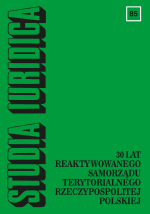Stałe składowe efektywności samorządu gminnego
Constant components of the municipal self-government
efficiency
Author(s): Tomasz BąkowskiSubject(s): Politics / Political Sciences, Politics, Law, Constitution, Jurisprudence, Public Administration
Published by: Wydawnictwa Uniwersytetu Warszawskiego
Keywords: municipal self-government; efficiency; municipal tasks; collective needs of the community; cooperation; measures implementation of municipal tasks; samorząd gminny; efektywność; zadania gminy
Summary/Abstract: The thirtieth anniversary of the return of local government at the municipal level to the Polish legal and constitutional order prompts various reflections and summaries. There is also time to ask questions about basic issues. Such is the question about the existence of permanent and durable elements in the institution of local self-government, not susceptible to changes in the economic, technological or cultural environment. They include, first of all: 1) the legal nature of the municipal self-government (in terms of public and private law); 2) general goals justifying its existence; or 3) the ways and methods of their implementation. Considering the utilitarian and praxeological context of the existence of local self-government, it is worth paying attention, above all, to those permanent elements that determine the task-related effectiveness of the municipality. They are in particular: 1) collective needs of the community; 2) cooperation of the municipality with other entities and 3) measures conditioning the implementation of tasks entrusted to the municipality. The above enumeration does not reflect the full list of determinants of the effectiveness of local government institutions, but nevertheless it seems reasonable to present a few comments and observations on the indicated elements, which could also be treated as a source of verifying the correctness of the choice made.
Journal: Studia Iuridica
- Issue Year: 2020
- Issue No: 85
- Page Range: 109-125
- Page Count: 17
- Language: Polish

